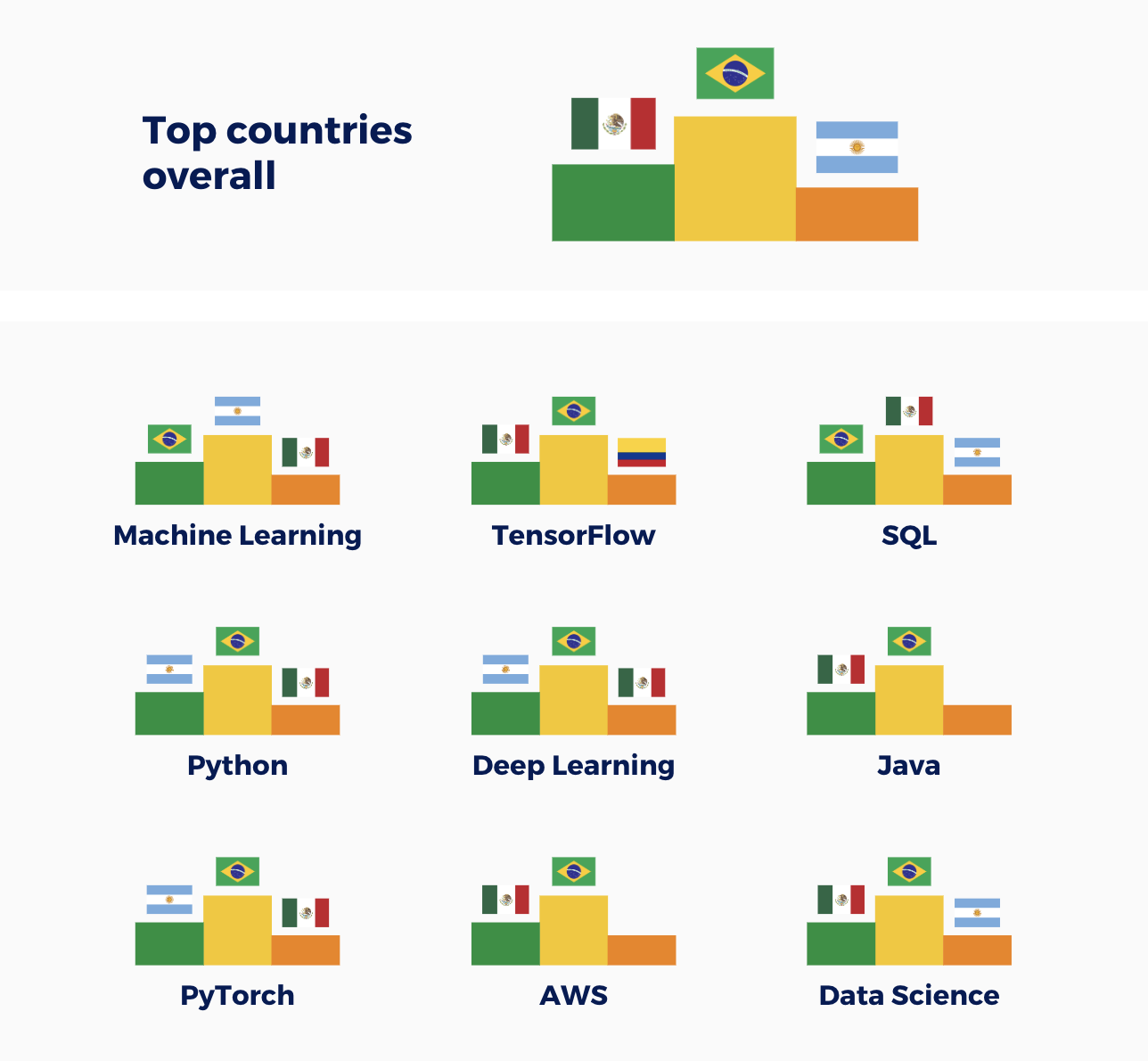As per HackerRank's data, from mid-2023 onwards, the following positions have seen a surge in demand - and we've included the number of skilled ai developers available in Latin America for each role.
| Positions with increased volume |
Professionals available in LATAM |
| Security Engineer (Cybersecurity): Up 28% |
7.8k+ |
| Data Engineer: Up 21% |
26k+ |
| Machine Learning Engineer: Up 16% |
5.7k+ |
| Business Analyst: Up 15% |
140k+ |
| Backend Engineer: Up 11% |
10k+ |
*Profiles available on LinkedIn using those keywords in their profile
Top 10 Skills per AI-related Roles
According to HackerRank, test creations for AI skills tests increased 58%, and a sharp uptake of Large Language Model (LLM) test creations, non-existent before July 2023.
Since August 2023, many tech job postings include positions in emerging technologies or requiring emerging tech skills.
Here are the 10 essential skills for remote AI jobs, along with the countries in LATAM where you can find the highest number of ai developers proficient in these skills.
It's crucial for startups and small businesses to understand the in-demand AI skills in Latin America to effectively navigate the region and hire tech talent for remote AI jobs.
Common Skills Across Roles for AI developers:
Role-Specific Skills:
- Data Engineer:
- Spark
- Scala
- Kafka
- ETL
- Airflow
- Snowflake
- Machine Learning Engineer:
- NLP
- TensorFlow
- Deep Learning
- Pytorch
- Computer Vision
- Business Analyst:
- Tableau
- Looker
- Data Analysis
- R
- Microsoft Excel
- ETL
- Data Warehousing
- Financial Modeling
In-Demand AI Skills in Latin America and Top Countries per Skills
When looking at the top ai skills in Latin America (LATAM), it's evident that certain countries stand out for their expertise in specific areas.
For Machine Learning, Argentina, Brazil, and Mexico lead the pack of ai developers, showcasing their proficiency in this cutting-edge field. Python, a versatile and widely-used programming language, is highly sought after in Brazil, Argentina, and Mexico, highlighting the region's strength in software development. Moreover, PyTorch, a popular deep learning framework, is prominently featured in Brazil, Argentina, and Mexico, indicating a strong foundation in artificial intelligence research and development.
Furthermore, when it comes to TensorFlow, an essential tool in machine learning and deep learning projects, Brazil, Mexico, and Colombia demonstrate their prowess in this area. Deep Learning, a subset of machine learning that focuses on neural networks, is particularly prominent in Brazil, Argentina, and Mexico, showcasing the region's expertise in advanced AI technologies.

In addition, AWS, a cloud computing platform, is widely used in Brazil and Mexico, reflecting the region's adoption of cloud-based solutions. SQL, a fundamental database language, is highly valued in Mexico, Brazil, and Argentina, underscoring the importance of data management skills in the region. Java, a popular programming language for building enterprise applications, is prevalent in Brazil and Mexico, indicating a strong foundation in software development.
Lastly, Data Science, a multidisciplinary field that combines statistics, machine learning, and data analysis, is thriving in Brazil, Mexico, and Argentina, showcasing the region's expertise in extracting valuable insights from data.
With these in-demand AI skills in Latin America, businesses can tap into a diverse talent pool with specialized ai careers to fill remote AI jobs or hire AI developers.
AI in Latin America: Readiness, Challenges and Opportunities
While Latin America (LATAM) holds immense potential for AI development, various challenges hinder its readiness to fully embrace the transformative power of artificial intelligence. Understanding these challenges and opportunities is crucial for businesses looking to tap into the region's AI developers.
- Latin America lags in the Government AI Readiness Index facing hurdles in establishing robust policies, infrastructure, and education systems conducive to AI growth
- Slow growth in AI skills in Latin America and lack of training programs. Despite a few countries standing out, the overall region's workforce still needs to acquire and adapt to AI skills at a faster pace to meet the demands of emerging technologies, remote AI jobs, or an AI career. One of the critical challenges is the limited availability of training and job retraining programs in AI. While Brazil integrates AI elements into its national school curriculum, other countries focus primarily on digital skills and ICT competencies.
- AI is forecasted to boost LATAM's GDP by over 5% by 2030. Despite the challenges, there's optimism regarding the potential economic impact of AI in the region. However, these projections depend on governments introducing policies to build talent with AI skills in Latin America, and expand digital infrastructure.
- Some countries in the region, such as Argentina, Brazil, Chile, Colombia, and Uruguay, have released standalone national AI strategies. These strategies prioritize cultivating local talent, strengthening technological infrastructure, and ensuring responsible AI deployment.
- Colombia's Approach: Introducing regulatory sandboxes, establishing standards for inclusiveness, and developing a national AI ethics framework.
- Brazil's Initiatives: Reviewing the national teaching curriculum, introducing AI and programming courses, and launching a national digital literacy program and teacher retraining opportunities.
- Chile's Focus: Updating data governance regulations, ensuring high-quality datasets, setting standards for digital services, and modernizing laws for legal certainty in the digital ecosystem.
Final thoughts - A prime spot for early Artificial Intelligence developers.
Latin America is gearing up for AI growth despite facing some hurdles. If you need to hire developers with ai skillsets, the region already has the talent needed for remote AI jobs.
As policies and education systems adapt to prioritize AI, businesses have a great chance to tap into the talent pool for remote AI jobs. By tapping into the AI skills in Latin America, companies can play a part in the region's evolution.
Ready to find AI developers in Latin America?

References
- Government AI Readiness Index 2023
- Seizing the Opportunity: The Future of AI in Latin America
- Latin American Artificial Intelligence Index
- HackerRank 2024 Developer Skills Report
- HackerRank 2023 Developer Skills Report